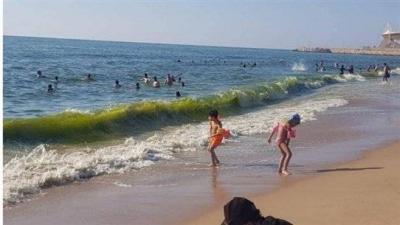The disasters that befall the Lebanese people come like lightning strikes, extending beyond the confines of acute living and economic crises, the rising costs, and the increasing dollar rate. Recently, the situation escalated to food poisoning and marine pollution in two notable phenomena during the summer, amidst rising temperatures, humidity, and almost constant power outages.
"Voice of the Nation" observed two significant phenomena in Sidon over the past few days. The first: dozens of Sidonians suffered from mild food poisoning, with some experiencing diarrhea, vomiting, and weakness, while others had elevated temperatures, prompting them to visit pharmacies for remedies as per the pharmacist's advice or to go to the emergency rooms in hospitals for quick treatment and then leave without the need for hospitalization, continuing their medication at home to save money.
A doctor from one of the emergency departments confirmed to "Voice of the Nation" that they noticed an increase in the number of patients with mild or non-serious food poisoning who came to the hospital suffering from diarrhea, vomiting, elevated temperatures, and stomach pain. Medical examinations and laboratory tests, including blood tests, are performed to determine if the poisoning had progressed and affected the bloodstream. Then, appropriate treatment is provided, and in many cases, patients leave after a few hours, continuing their treatment at home.
Doctors and food experts say there are various reasons for these poisoning cases, including poor food preservation practices during the summer, which, due to frequent electricity outages, leads to some food spoiling as it thaws and is then refrozen, especially meats and poultry in household refrigerators and several shop displays.
The second phenomenon: what was witnessed in Sidon's sea, where its waters turned green, causing concerns among visitors fearing contamination that poses a health risk, particularly at the "public pool," which serves as a refuge for poor Sidonian families and those with limited incomes who cannot afford private pools due to rising fees. This situation caused visitors to avoid the "greened" water areas for fear of pollutants or dangerous substances or bacteria that might have been thrown into the sea and reacted with its waters, turning them green and being pushed towards the Sidonian shore by marine currents.
Environmental activist and member of the "Friends of Zira and Sidon Beach Association," Rabi'a Al-Aouji, confirmed to "Voice of the Nation" that the greening of Sidon's beach waters is due to the artificial Qaraoun Lake in the Bekaa region, which has suffered from pollution for years due to the dumping of industrial waste. He pointed out that there have been many attempts to reduce pollution, including efforts from the European Union for treatment, but no results have been achieved yet.
He stated that the pollution is not limited to the lake itself. Along the river pathways from Qaraoun to Anan, reaching the Al-Awli river and the sea, there are numerous violations involving the dumping of industrial waste, discharging sewage, and other toxic materials. This leads to the growth of harmful "algae," making the water green and resulting from the proliferation of bacteria harmful to marine life and fisheries.
Al-Aouji called for the research center to take responsibility and conduct immediate sampling and testing of the sea water to determine pollutant levels and inform visitors whether it is suitable for swimming. He also advised beachgoers to practice their swimming hobby cautiously to avoid the risk of skin diseases they could do without, urging "officials in the Ministry of the Environment and all relevant ministries and departments to fulfill their role in alleviating the damage to Sidon's beach and cleaning the lake."




